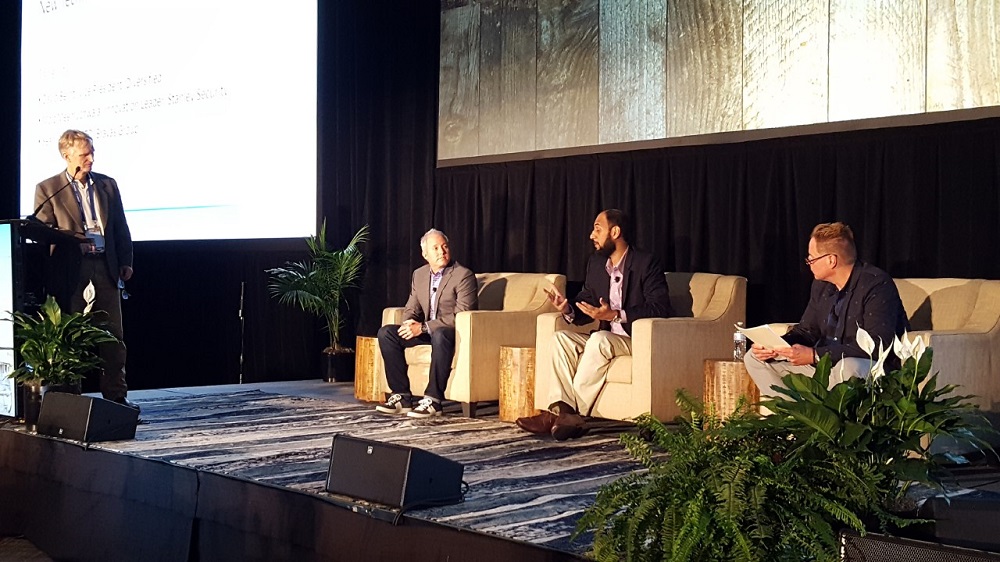Panelists at the recent Total Tech Summit were tasked with answering an important question: how will new technologies like 5G, analytics, and AI impact the businesses who provide customers the latest in tech?
The Total Tech Summit 2019 once again convened top dealers in the residential (CE Pro), commercial (Commercial Integrator) and security (Security Sales & Integration) integration trades, this year being staged in Fort Worth, Texas.
The opening day of the combined CE Summit, CI Summit and SSI Summit at the Fort Worth Convention Center, Texas featured CE Pro editor Jason Knott prodding panelists Sean Weiner, CTO, Bravas Group, representing the resi angle; David Berndt, regional VP, Diversified, in the commercial market; and Moiz Neemuchwala, innovation leader, Stanley Security, on the security side.
Two main technologies in question included 5G, analytics/AI.
“In many cases they’re great opportunities but in some cases they’re potential threats, so we’re going to look at both sides of the coin,” Knott noted.
He cited past dual-perspective examples in the respective market sectors such as Sonos’ entry into the multiroom audio category, AV over IP signal transmission and wireless PIR security sensors… all game-changing opportunities for installation deployments, but also requiring some rethinking of business models and product offerings.
Factoring in 5G
The transition to 5G networks stands to impact billions of IoT devices in the years to come, so how are integrators bracing for that?
“Probably the biggest change is going to be the way the devices connect to one another,” Weiner predicts.
“I think it’s a good opportunity for us to add sensors and add devices because of the capacity that 5G brings and they’ll be a little easier to deploy because it’s not necessarily dependent on the Wi-Fi network itself, but it definitely presents a challenge for us and for manufacturers room to make sure that communication stays intact during the process.”
Berndt pointed to three areas of focus for particular Diversified specialties.
“For our mission-control environment it’s how we help support remote areas that we didn’t have the ability to support. It’s how we’re delivering digital signage in our digital media group. And in our sports and entertainment it’s how we’re delivering video from remote to stadiums,” he says.
For the security industry especially, 5G has the potential to majorly impact transmissions from surveillance cameras to security systems and monitoring stations, Neemuchwala says.
“What I really see is the amount of data that 5G can right now communicate directly into our monitoring stations could be of immense value… right now there is limited access to [those cameras],” he says. “We can see there is significant potential for this solution overall.”
To get there, changes will need to be made on the infrastructure end to capture all the potential data; but as that happens security providers and central monitoring stations will be able to create more insights for customers and at a much faster rate “than we could ever have thought about,” Neemuchwala says.
Taking Advantage of Data
Along the lines of 5G’s looming growth is the expanding market for analytics and their impact on IoT, especially to aid business customers on the security and commercial markets.
At Total Tech Summit 2019, Knott pointed to Statista research predicting the amount of IoT devices skyrocketing from 6.6 billion this year to 30 billion by the end of next year.
That’s an awful lot of data coming in from all of those devices for customers. How can they make sense of the information flood, and how will integrators and their clients benefit?
“On the corporate level, we’re finding analytics very useful for managed services and service,” explains Berndt. “We can diagnose a problem before it happens, or the service center can respond to it quicker because they understand what’s going on.
“It’s helping on our design side, because we can analyze and look at data of what rooms technology is being used, how often and what technology is used, what technology is not used. It’s helping us build room technology standards for corporate clients,” he says.
Diversified installs technology in hundreds of rooms for Google, Berndt notes, and it can analyze the data to advise on the next phase of updating conference rooms, collaboration rooms and such that might only be two years old.










